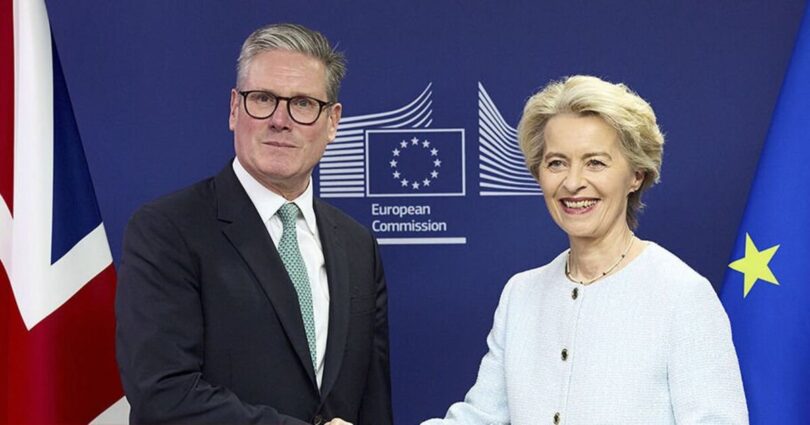For many people, 31 January 2020 is etched into their memory, the historic day when Britain finally left the EU after 47 years membership.
But as far as memorable dates go, 3 February 2025 doesn’t immediately jump out as being remarkable.
So what is the significance of this particular mid-winter Monday, some five years after Brexit Day?
It just so happens to be when Keir Starmer becomes the first Prime Minister this decade to attend a meeting of EU leaders.
Sir Keir regards it as a natural continuation of his efforts to “reset” relations with the bloc.
But many see this as his most brazen act of Brexit betrayal yet.
Since he entered Downing Street last July the Labour leader has systematically worked his way through an ever growing list of ways to hitch Britain to the European bandwagon once again.
Don’t miss… Keir Starmer will have a migraine after this latest farmers protest over crue… [LATEST]
Brexit Day (Image: Getty)
His invitation to Brussels follows months of fawning diplomacy during which the Government has overtly courted trading and security partnerships with the EU.
Senior ministers have made several visits to meetings of their European counterparts, with Rachel Reeves becoming the first Chancellor since Brexit to attend a meeting of EU finance ministers this week while David Lammy met with foreign ministers earlier in the year.
February’s trip to the Belgian capital was announced after Sir Keir met European Council president Antonio Costa for a cosy tête-à-tête in No 10 on Thursday.
Downing Street said the pair also looked ahead to the EU-UK summit in early 2025, saying it would “provide an important opportunity to make further progress on key areas to deliver tangible benefits for the people of the UK and the EU”.
This came after Sir Keir and European Commission president Ursula von der Leyen agreed to hold a series of annual summits between Britain and the EU when they met in October.
In a very public show of his desire for closer ties with Brussels, the Prime Minister boldly declared he was “putting our relationship with Europe on a more solid, stable position. That’s what the British people want.”
Then and now, Sir Keir’s wish list is a long one.
He wants closer co-operation on defence and security, including energy security, as well as on climate change, illegal migration, and on delivering economic growth.
Sir Keir claims he wants Brexit to work in the UK’s interest. But the signs are that he is trying to unpick as much of it as he can, stitch by stitch.
Late one Friday night around three weeks ago the government snuck out a job ad to hire a new negotiator to help deliver a “reset” of relations with Europe.
They will be paid up to £200,000 – more than the Prime Minister himself – with a staggering gold plated pension contribution of £44,324 to schmooze eurocrats.
The catchily titled Second Permanent Secretary for European Union and International Economic Affairs will be required to oversee and lead policy development on trade, including the Windsor Framework, the Trade and Cooperation Agreement, the Entry and Exit Scheme – a new upcoming digital EU border scheme – and other border policy questions.
Sir Keir has previously said he would seek a better deal with the EU on trade than the one negotiated by Boris Johnson in late 2020.
Through gritted teeth he has also been at pains to say that resetting does not mean reversing Brexit.

Donald Trump (Image: Getty)
But Sir Keir has a big problem. A big Donald Trump-sized problem.
The President-elect’s senior economic advisor Stephen Moore has said the UK has to choose between the European economic model of “more socialism” and the US model which is more based on a free enterprise system.
He said the UK is « caught in the middle », but believed « Britain would be better off moving towards more of the American model of economic freedom and if that were the case, I think it would spur the Trump administration’s willingness to do the free trade agreement with the UK ».
Experts say Labour’s zeal to strip away what it calls “unnecessary trade barriers” is also deeply concerning.
Brussels says those barriers are a result of the UK’s own choices: leaving the single market and customs union.
The government wants to ease the movement of food and drinks exports. It wants easier access for UK artists, including musicians to the EU.
Some EU member states want enhanced fishing rights in UK waters.
As former EU negotiator Lord Frost warned: “If the EU gives you something, it wants something back.”
Trump will dominate global politics and economics for the rest of this decade and our special relationship with the US will be crucial to how Britain fares.
Sir Keir’s plans for closer links to Europe on security and defence are also problematic.
Relations have steadily improved since Russia’s full-scale invasion of Ukraine.
The two sides worked rapidly and closely to impose sanctions on Moscow and boost Kiev’s defences. The UK leading the way on the latter.
But Sir Keir’s push for closer ties with the EU puts Nato at risk, according to Nigel Farage.
In the summer, just days after becoming Prime Minister, Sir Keir opened the door to a new security treaty with Brussels as he hosted 46 European leaders at Blenheim Palace for the European Political Community summit.
The Reform UK boss has warned that Trump could walk away from Nato if the Europeans undermined it with an EU rival.
“Anything that takes us closer to a European Defence Union is a massive strategic mistake,” he said at the time.

Nigel Farage (Image: Getty)
On migration, there’s clear cross-Channel agreement that people-smuggling gangs must be stopped and illegal migration tackled.
But how it gets dealt with is the problem.
The Labour leader has scrapped the Rwanda deterrent, now being considered by Germany, which has triggered a surge in small boat crossings.
But with the stroke of a pen he sidled up to Europe in November, signing three new agreements to crack down on smuggling gangs.
Saying a “major upgrade” on international co-operation is needed, the prime minister announced plans to sign three new agreements with Serbia, North Macedonia and Kosovo.
The deals will increase intelligence sharing, expertise and co-operation in order to intercept criminal smuggling gangs, the government said.
Meanwhile, it always pays to read the small print.
In Labour’s election manifesto this year, Keir Starmer sought to reassure Brexiteers ruling out a return to the EU single market.
But he did insert a small-print proviso.
The Labour leader said that he did not rule out doing much the same thing by realigning Britain piecemeal with EU standards.
This process he has now started.
Lord Frost has pointed out that the government’s unremarkable-sounding Product Regulation and Metrology Bill is something of a Trojan horse.
While it generally covers product safety and weights and measures, a sneakily-inserted Clause 1(2) also expressly allows the government to import wholesale EU regulations on products’ environmental impact.
This clause is not limited to products for export to the EU. It explicitly applies to all goods put on the UK market. This is a big change.
Although goods for export are for obvious reasons subject to EU requirements, an important benefit of Brexit has been to return to manufacturers and importers dealing purely with the domestic market their freedom to ignore the EU. This freedom is now at risk.
Ultimately, Sir Keir is playing a long game. What Labour strategists are hoping for is a gradual but discreet increase in de facto EU control.
This surrender would leave Britain more and more in the position of an EU rule-taker like Norway or Switzerland.

Brexit Day (Image: Getty)
But Sir Keir’s hopes to re-enter the EU’s orbit won’t go down with the 17.4 million people who voted for Brexit in the first place.
With Reform UK breathing down the necks of both the Tories and Labour, the Prime Minister’s masterplan for closer ties with Europe is doomed to failure if immigration numbers, both legal and illegal, don’t fall rapidly over the next few years and the economy suffers.
When Sir Keir arrives in Brussels for the February reunion the Union Jack will no doubt appear next to the European flag.
It will be a stark reminder of what he craves but what so many people rejected on another historical and memorable date, 23 June 2016, when Britain decided to quit the EU.
Source link








